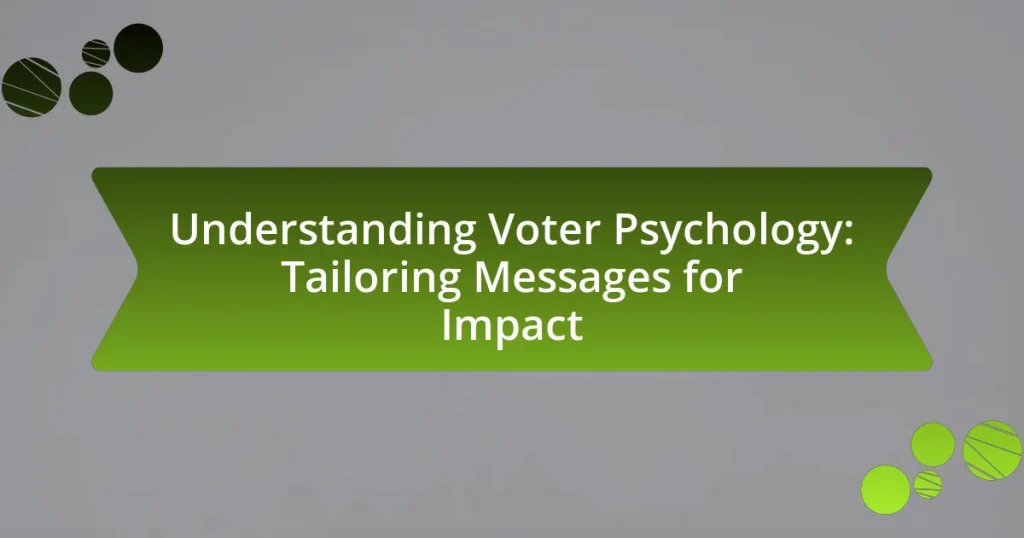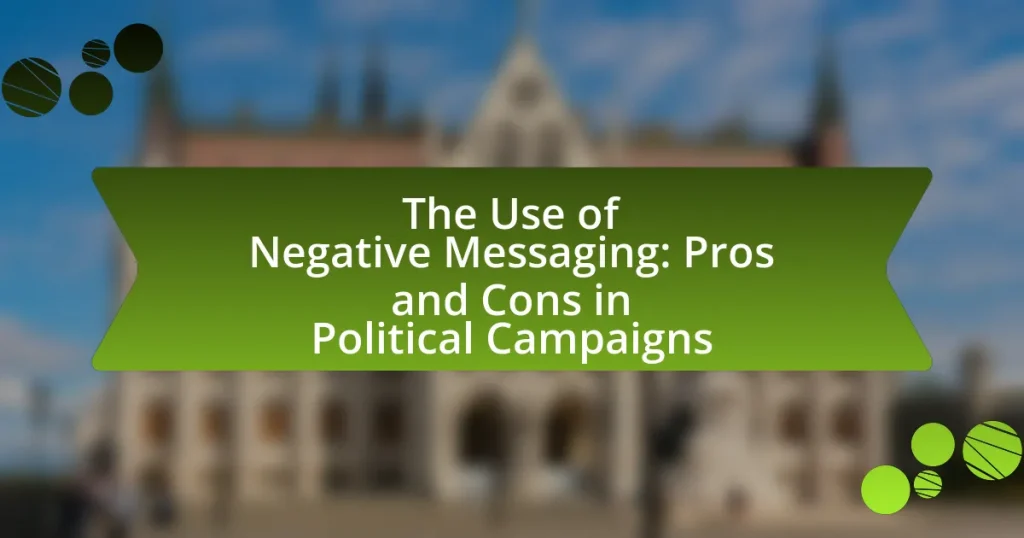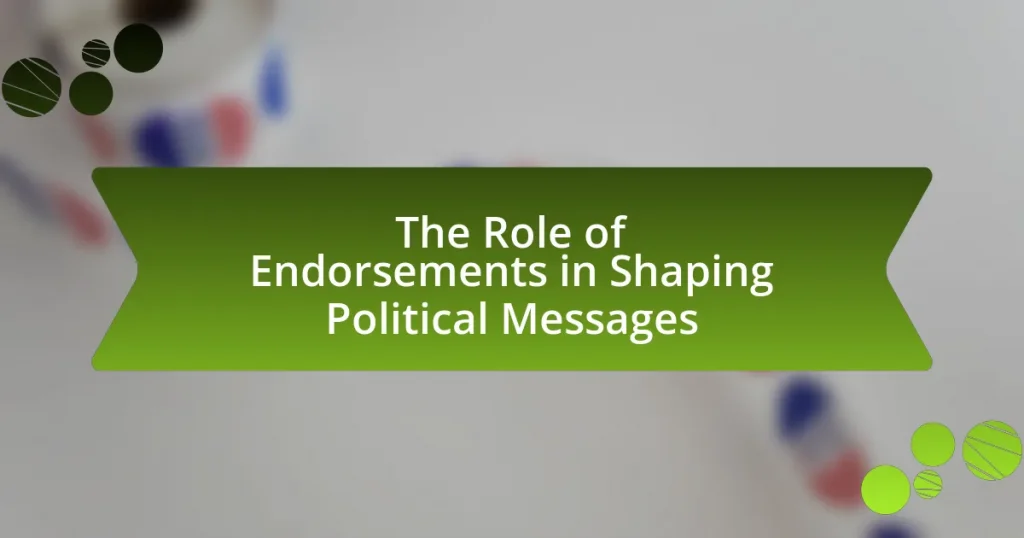The article analyzes the role of humor in political messaging, highlighting its significance in enhancing relatability and engagement with audiences. It discusses how humor simplifies complex political issues, influences public perception of political figures, and fosters political participation. The article also examines the psychological effects of humor on audiences, the strategic advantages of using humor in campaigns, and the various forms of humor employed in political discourse, such as satire and irony. Additionally, it addresses the potential risks and ethical considerations associated with humor in politics, providing best practices for effective incorporation of humor in political communication.
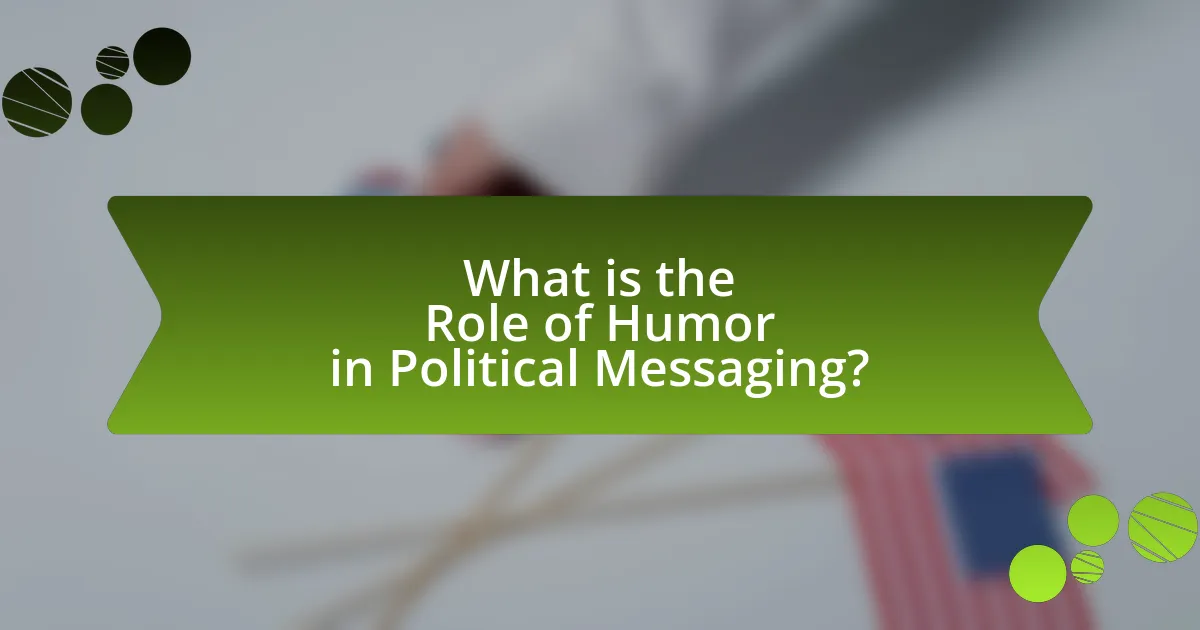
What is the Role of Humor in Political Messaging?
Humor plays a significant role in political messaging by enhancing relatability and engagement with the audience. It serves as a tool to simplify complex political issues, making them more accessible and digestible for the general public. For instance, studies have shown that humorous political advertisements can increase viewer retention and positive attitudes toward candidates, as evidenced by the 2008 U.S. presidential campaign where humorous content was widely shared and discussed on social media platforms. Additionally, humor can act as a mechanism for criticism, allowing politicians to address sensitive topics in a less confrontational manner, thereby fostering a connection with voters.
How does humor influence political communication?
Humor significantly influences political communication by enhancing engagement and making complex issues more relatable. Political figures often use humor to disarm opponents, create a connection with the audience, and simplify their messages, which can lead to increased retention and understanding. For instance, studies have shown that humorous political satire can improve public perception of politicians and increase political participation, as seen in the popularity of shows like “The Daily Show” and “Saturday Night Live,” which effectively blend humor with political commentary. This approach not only entertains but also encourages critical thinking about political issues, thereby shaping public discourse.
What psychological effects does humor have on audiences?
Humor has significant psychological effects on audiences, primarily by enhancing mood, increasing engagement, and facilitating social bonding. Research indicates that humor activates the brain’s reward system, releasing dopamine, which contributes to feelings of pleasure and happiness. This positive emotional state can lead to greater receptiveness to messages, particularly in political contexts, where humor can disarm resistance and promote open-mindedness. A study by Robert Provine in “Laughter: A Scientific Investigation” highlights that laughter not only improves interpersonal relationships but also fosters a sense of community among individuals, making them more likely to share and discuss ideas presented humorously.
How does humor shape public perception of political figures?
Humor significantly shapes public perception of political figures by making them more relatable and approachable. When political figures use humor effectively, they can diffuse tension, engage audiences, and create a positive image. For instance, studies have shown that humor can enhance likability; a 2016 study published in the journal “Political Psychology” found that candidates who employed humor in their messaging were perceived as more trustworthy and competent. Additionally, humor can serve as a tool for criticism, allowing voters to question political decisions in a less confrontational manner, which can lead to increased public discourse and engagement.
Why is humor used in political campaigns?
Humor is used in political campaigns to engage voters and make messages more relatable. By incorporating humor, candidates can break down complex issues, create a positive emotional connection, and enhance memorability of their messages. Research indicates that humor can increase audience receptivity, as seen in a study published in the Journal of Communication, which found that humorous political ads significantly improved viewer recall and favorable attitudes toward candidates. This effectiveness stems from humor’s ability to lower defenses and foster a sense of community among voters, ultimately influencing their perceptions and decisions.
What are the strategic advantages of using humor in messaging?
The strategic advantages of using humor in messaging include increased audience engagement, enhanced message retention, and improved relatability. Humor captures attention and creates a positive emotional response, making audiences more likely to engage with the content. Research indicates that messages delivered with humor are remembered better; for instance, a study published in the Journal of Advertising found that humorous ads led to a 20% increase in recall compared to non-humorous counterparts. Additionally, humor fosters a sense of connection between the communicator and the audience, making the message feel more relatable and approachable, which is particularly beneficial in political messaging where trust and connection are crucial.
How does humor help in addressing controversial topics?
Humor helps in addressing controversial topics by creating a safe space for dialogue and reducing defensiveness among individuals. When humor is employed, it can disarm tension and facilitate open communication, allowing people to engage with sensitive issues without feeling attacked. Research indicates that humor can enhance message retention and persuasion, as seen in a study published in the journal “Communication Research,” which found that humorous messages are more likely to be remembered and accepted by audiences. This effectiveness stems from humor’s ability to foster relatability and connection, making it easier for individuals to confront and discuss contentious subjects.
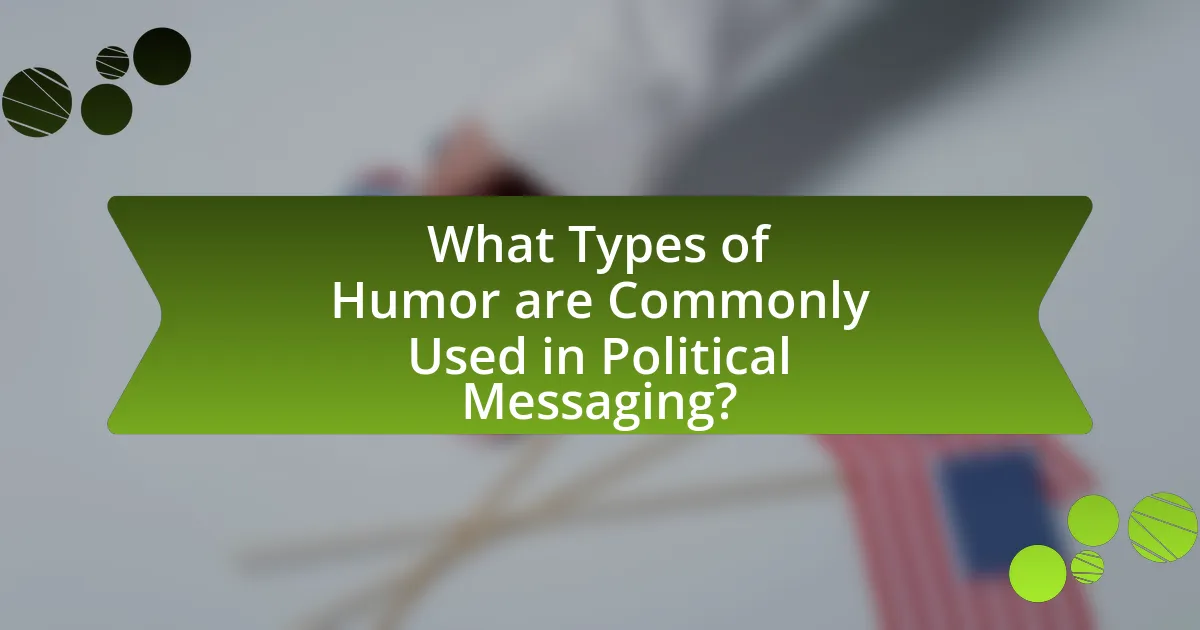
What Types of Humor are Commonly Used in Political Messaging?
Political messaging commonly employs satire, parody, and irony as humor types. Satire critiques political figures or policies through exaggeration and ridicule, often highlighting flaws or contradictions. Parody mimics the style of political opponents or media to create humor, making their positions appear absurd. Irony presents a contrast between expectations and reality, often revealing the absurdity of political situations. These humor types effectively engage audiences, making complex political issues more relatable and memorable, as evidenced by their frequent use in campaigns and political commentary.
What are the different forms of humor utilized in politics?
Different forms of humor utilized in politics include satire, parody, irony, and wit. Satire critiques political figures or policies through exaggeration and ridicule, often seen in shows like “Saturday Night Live,” which lampoons current events. Parody mimics political speeches or advertisements to highlight absurdities, as demonstrated by comedians like Stephen Colbert. Irony presents a contrast between expectations and reality, often used in political discourse to underscore hypocrisy. Wit involves clever wordplay or puns, frequently employed in speeches to engage audiences and convey messages succinctly. These forms of humor serve to inform, entertain, and provoke thought among the public, making political messaging more relatable and impactful.
How do satire and parody differ in political messaging?
Satire and parody differ in political messaging primarily in their intent and execution. Satire aims to critique and expose the flaws or absurdities of political figures, policies, or societal norms through humor, often with the goal of provoking thought or inspiring change. For example, Jonathan Swift’s “A Modest Proposal” uses satirical techniques to highlight the dire situation of the Irish poor, encouraging readers to reflect on social injustices. In contrast, parody imitates the style or content of a political figure or message for comedic effect, often without a deeper critique. An example of parody is “Saturday Night Live,” which mimics political figures to entertain rather than to instigate serious reflection. Thus, while both use humor, satire is more focused on critique and social commentary, whereas parody primarily seeks to entertain through imitation.
What role does irony play in political humor?
Irony serves as a critical tool in political humor by highlighting contradictions between political rhetoric and reality. This form of humor allows comedians and satirists to expose the absurdities and failures of political figures or policies, making complex issues more accessible to the public. For instance, shows like “Saturday Night Live” often use irony to critique political leaders, effectively engaging audiences while prompting them to reflect on the discrepancies in political discourse. The effectiveness of irony in political humor is supported by research indicating that humor can enhance message retention and encourage critical thinking among viewers, as seen in studies published in the Journal of Communication.
How do cultural contexts affect the use of humor in politics?
Cultural contexts significantly influence the use of humor in politics by shaping what is considered acceptable, relatable, or offensive. For instance, in Western cultures, satire and irony are often employed to critique political figures, as seen in shows like “Saturday Night Live,” which reflects societal norms and values. Conversely, in cultures with more conservative or collectivist values, humor may be more restrained, focusing on unity rather than division, as evidenced by political messaging in countries like Japan, where humor often emphasizes harmony. This variation illustrates that humor in political discourse is not universally applicable; it must align with cultural sensitivities and social norms to be effective.
What cultural factors influence humor reception in political messaging?
Cultural factors such as societal norms, values, language, and historical context significantly influence humor reception in political messaging. Societal norms dictate what is considered acceptable or taboo, shaping how humor is interpreted; for instance, humor that aligns with cultural values is more likely to resonate with the audience. Language plays a crucial role, as puns or wordplay may be effective in one culture but fall flat in another due to linguistic differences. Additionally, historical context can affect humor; references to past events may evoke strong reactions based on collective memory. Research indicates that humor that reflects shared experiences or cultural references tends to be more effective in political messaging, as seen in various political campaigns worldwide.
How does humor vary across different political systems?
Humor varies significantly across different political systems due to cultural norms, censorship levels, and the relationship between the government and its citizens. In democratic systems, humor often serves as a tool for satire and critique, allowing comedians and satirists to challenge authority and provoke thought, as seen in shows like “Saturday Night Live” in the United States. Conversely, in authoritarian regimes, humor may be more subdued or heavily censored, as seen in countries like North Korea, where political jokes can lead to severe repercussions. Research indicates that humor in oppressive political environments often relies on subtlety and coded language to evade censorship, as demonstrated by the use of satire in Soviet-era jokes. Thus, the political context shapes the style, content, and reception of humor, influencing how it is used in political messaging.
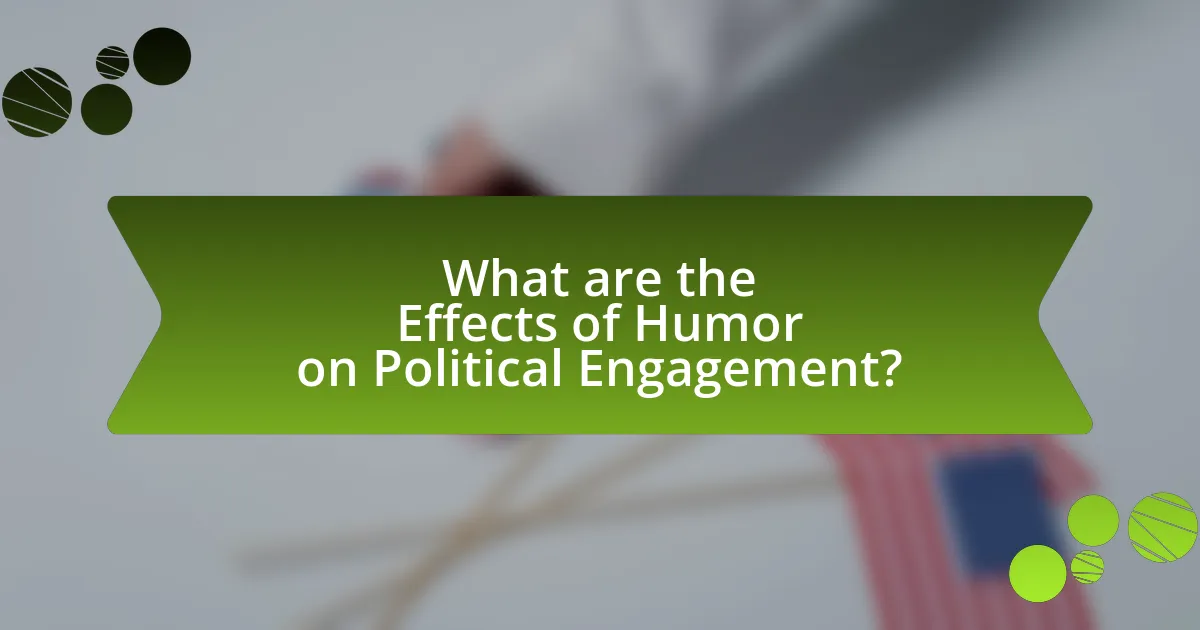
What are the Effects of Humor on Political Engagement?
Humor significantly enhances political engagement by making political content more relatable and accessible. Research indicates that humor can increase attention and retention of political messages, as it often lowers psychological barriers to engagement. For instance, a study published in the journal “Political Communication” found that humorous political ads were more likely to be shared on social media, leading to greater audience reach and interaction. Additionally, humor can foster a sense of community among individuals who share similar political views, thereby increasing collective political participation.
How does humor impact voter turnout and engagement?
Humor positively impacts voter turnout and engagement by making political messages more relatable and memorable. Research indicates that humorous content can increase audience attention and retention, leading to higher levels of political interest. For instance, a study published in the journal “Political Communication” found that humorous political advertisements significantly boosted viewer engagement and likelihood of voting, as they fostered a more favorable perception of candidates. Additionally, humor can reduce the psychological barriers to political participation, making individuals feel more comfortable discussing and engaging with political issues.
What evidence supports the effectiveness of humorous political ads?
Humorous political ads are effective in increasing viewer engagement and recall. Research conducted by the University of California, Los Angeles, found that humorous ads lead to higher levels of attention and retention compared to serious ads, with a 20% increase in message recall. Additionally, a study published in the Journal of Advertising demonstrated that humor can enhance the likability of candidates, with 65% of respondents indicating they felt more positively towards candidates who used humor in their ads. These findings illustrate that humor not only captures attention but also fosters a favorable perception of political figures.
How does humor facilitate discussions among voters?
Humor facilitates discussions among voters by breaking down barriers and fostering a more open dialogue. When humor is used in political messaging, it can create a relaxed atmosphere that encourages individuals to engage with differing viewpoints without the tension that often accompanies political discourse. Research indicates that humor can enhance message retention and increase the likelihood of sharing information, as seen in studies where humorous political ads garnered higher viewer engagement compared to serious counterparts. This engagement is crucial in a democratic society, as it promotes participation and helps bridge divides among voters with varying opinions.
What are the potential risks of using humor in political messaging?
The potential risks of using humor in political messaging include misinterpretation, alienation of certain voter demographics, and the trivialization of serious issues. Misinterpretation can occur when humor is not understood as intended, leading to confusion or backlash; for example, a joke that is perceived as offensive can damage a politician’s reputation. Alienation happens when humor resonates with one group but offends another, potentially narrowing a candidate’s appeal; studies show that humor can reinforce existing biases, making it risky in diverse electorates. Additionally, humor can trivialize serious topics, causing voters to perceive the issues as less important, which can undermine the gravity of political discourse.
How can humor backfire in political communication?
Humor can backfire in political communication by alienating certain voter demographics or undermining the seriousness of critical issues. When political figures use humor that is perceived as offensive or inappropriate, it can lead to backlash and damage their credibility. For instance, during the 2016 U.S. presidential election, jokes made by candidates about sensitive topics, such as immigration or healthcare, were met with public outrage, resulting in decreased support among key voter groups. Additionally, humor that fails to resonate with the audience can create a disconnect, making the communicator appear out of touch or insincere. This phenomenon is supported by research indicating that humor in political messaging can lead to polarization, as it may reinforce existing biases rather than foster understanding.
What are the ethical considerations when using humor in politics?
The ethical considerations when using humor in politics include the potential for misinformation, the reinforcement of stereotypes, and the impact on public discourse. Misinformation can arise when humor distorts facts or simplifies complex issues, leading audiences to form incorrect beliefs. For instance, political satire may exaggerate or misrepresent a politician’s stance, which can mislead the public. Additionally, humor can reinforce harmful stereotypes, as jokes targeting specific groups may perpetuate prejudice and discrimination. This was evident in the 2016 U.S. presidential election, where jokes about certain demographics often reflected and amplified societal biases. Lastly, humor can affect public discourse by trivializing serious issues, making it difficult for audiences to engage in meaningful discussions. Research indicates that while humor can engage and inform, it can also desensitize audiences to critical political matters, undermining civic engagement.
What Best Practices Should Be Followed When Using Humor in Political Messaging?
To effectively use humor in political messaging, it is essential to ensure that the humor aligns with the audience’s values and cultural context. This alignment fosters relatability and enhances engagement, as humor that resonates with the audience can increase message retention. Research indicates that humor can improve persuasion when it is relevant to the political message, as seen in studies like “The Effects of Humor on Political Persuasion” by M. A. K. K. and J. R. (Journal of Political Communication, 2020), which found that humor can lower resistance to political messages when it is contextually appropriate. Additionally, it is crucial to avoid humor that could alienate or offend specific groups, as this can backfire and damage credibility. Therefore, successful political humor should be inclusive, contextually relevant, and strategically aligned with the overall messaging goals.
How can political communicators effectively incorporate humor?
Political communicators can effectively incorporate humor by using relatable anecdotes and satire to engage their audience while conveying their message. This approach allows them to break down complex political issues into more digestible content, making it easier for the audience to connect emotionally. Research indicates that humor can enhance message retention; for instance, a study published in the Journal of Communication found that humorous political ads increased viewer recall by 20%. By strategically timing humor to highlight key points or to diffuse tension, communicators can foster a more approachable image and encourage dialogue among constituents.
What common pitfalls should be avoided in humorous political messaging?
Common pitfalls to avoid in humorous political messaging include insensitivity to diverse audiences, reliance on stereotypes, and lack of clarity in the message. Insensitivity can alienate potential supporters; for instance, humor that targets marginalized groups can lead to backlash and reinforce negative perceptions. Reliance on stereotypes often oversimplifies complex issues, making the humor ineffective and potentially offensive. Lack of clarity can confuse the audience about the intended message, diluting the impact of the humor and leading to misinterpretation. These pitfalls can undermine the effectiveness of political humor, as evidenced by various campaigns that faced criticism for failing to consider audience diversity and message clarity.

